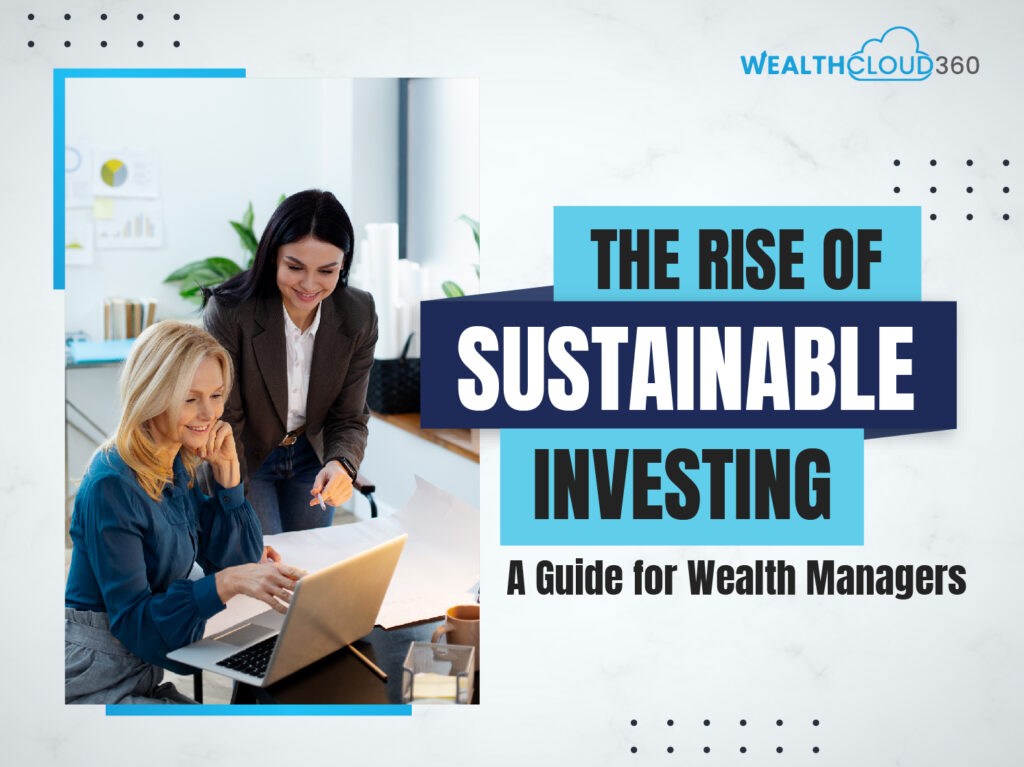The financial landscape has significantly shifted in recent years as investors increasingly prioritize sustainability in their portfolios. The rise of Sustainable Investing, incorporating Environmental, Social, and Governance (ESG) criteria, has become a dominant force in shaping investment strategies. Wealth managers now have a unique opportunity to guide their clients toward aligning their financial goals with their values. This blog will explore the growing trend of sustainable investing in 2024 and outline how wealth managers can effectively integrate wealth investment management into their clients’ portfolios.
Navigating Sustainable Wealth Management in 2024
Wealth managers are pivotal in guiding clients through this evolving landscape. They incorporate Environmental, Social, and Governance (ESG) criteria into investment strategies to align portfolios with values while maximizing financial returns. This comprehensive approach mitigates risks, fosters long-term client satisfaction, and strengthens the advisor-client relationship. A wealth advisor is poised to lead the way in sustainable wealth management in 2024 and beyond through ongoing education, leveraging advanced technology, and fostering transparent communication.
1. The Evolution of Sustainable Investing
Sustainable investing is not merely a passing trend but a fundamental shift in how investors approach wealth creation. As societal awareness of environmental and societal issues has grown, so has the demand for investments that contribute positively to the world. Investors increasingly recognize that financial success can be achieved with positive social and environmental impact.
2. ESG Criteria and Its Impact
ESG criteria serve as the bedrock of sustainable investing. Environmental factors consider a company’s impact on the planet, such as its carbon footprint and resource usage. Social factors gauge a company’s impact on people, encompassing labor practices, diversity and inclusion, and community relations. Governance factors evaluate a company’s leadership, ethics, and transparency.
Investors are now incorporating ESG considerations into their decision-making process, recognizing that a company’s long-term success is intrinsically linked to its sustainability practices. As wealth managers, understanding and integrating ESG criteria into investment strategies is crucial for meeting clients’ evolving demands.
3. Aligning Portfolios with Values
One critical role of a wealth manager in 2024 is assisting clients in aligning their portfolios with their values. Sustainable investing allows investors to support companies that share their ethical principles while potentially enjoying financial success. Wealth managers can achieve this alignment through thorough due diligence, selecting investments that meet financial objectives, and adhering to ESG principles.
Wealth managers can gain insight into clients’ values and preferences. Understanding the specific ESG factors that matter most to clients enables wealth managers to tailor investment strategies accordingly. This personalized approach enhances client satisfaction and strengthens the long-term client-advisor relationship.
4. Risk and Return in Sustainable Investing
Contrary to some misconceptions, sustainable investing does not necessarily mean sacrificing financial returns. Several studies have shown that companies with robust ESG practices often outperform their counterparts over a time period. Incorporating ESG criteria can provide a more comprehensive view of a company’s risk profile, helping wealth managers identify potential risks that might not be apparent through traditional financial analysis.
As wealth managers integrate sustainability into investment strategies, they should communicate the potential financial benefits of such an approach to clients. This includes emphasizing the resilience of sustainable investments in the face of environmental and social challenges and the potential for long-term value creation.
5. Wealth Managers and Sustainable Investing Education
Successfully integrating sustainable investing into wealth management practices requires ongoing education. Wealth managers must stay abreast of the latest developments in ESG criteria, industry trends, and sustainability best practices. Moreover, it is paramount to educate clients about the principles and benefits of sustainable investing.
Wealth managers can organize seminars and webinars or provide informative materials to empower clients with knowledge about sustainable investing. Wealth managers can deepen client understanding and commitment to sustainable investment principles by fostering a collaborative learning environment.
6. The Role of Technology in Sustainable Wealth Management
Technology plays a pivotal role in facilitating sustainable wealth management in the rapidly evolving financial landscape. Wealth managers can leverage advanced platforms and tools to analyze vast amounts of ESG data, identify high-performing sustainable investments, and track the impact of portfolios on environmental and social metrics.
One such innovative solution is Wealth Cloud 360, a comprehensive wealth management platform that seamlessly integrates sustainable investing into client portfolios. This platform provides wealth managers with real-time ESG data, performance analytics, and reporting tools, enabling them to make informed decisions aligned with their clients’ values.
Embrace Sustainable Wealth Management with Wealth Cloud 360
As the demand for sustainable investing continues to rise, wealth managers need cutting-edge tools to navigate this evolving landscape successfully. Wealth Cloud 360 offers a comprehensive solution for wealth managers looking to seamlessly integrate sustainable investing into their practices. By leveraging Technology, Artificial Intelligence (AI), Machine Learning (ML), wealth managers can meet and exceed client expectations in delivering the best online wealth management services and positive societal impact.
In conclusion, the rise of sustainable investing is reshaping the wealth management industry. Wealth managers must embrace this trend, incorporating ESG criteria into investment strategies, aligning portfolios with client values, and leveraging technology to stay ahead. With Wealth Cloud 360, wealth managers can lead the way in sustainable wealth management, offering clients the benefits of financial success and a positive impact on the world.



